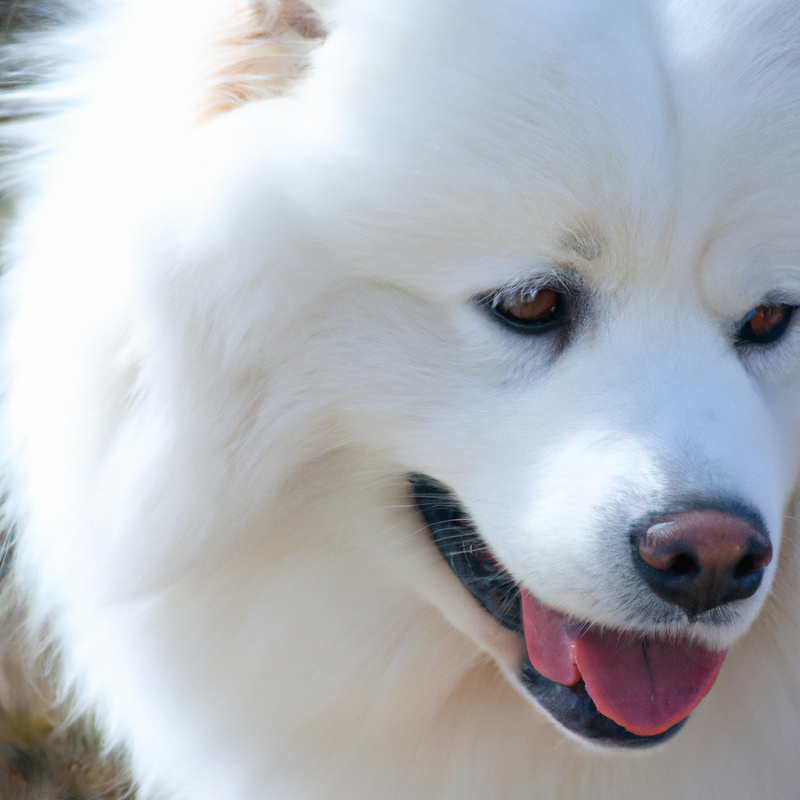Are Samoyeds Prone To Any Specific Health Issues?
Key Takeaways:
- Samoyeds are generally a healthy breed, but they may be prone to certain health issues.
- Samoyeds are prone to hip dysplasia, a common condition that affects their hip joints.
- Samoyeds may also be at risk for progressive retinal atrophy, a degenerative eye disorder.
- It’s important to prioritize regular vet check-ups and proper care to ensure the overall health and well-being of Samoyeds.
Are you considering bringing home a Samoyed?
These fluffy and friendly dogs are sure to melt your heart, but before you do, it’s essential to understand their specific health needs.
As an expert in canine health, I’m here to shed light on the common health issues that Samoyeds can be prone to.
From hip dysplasia to allergies, skin problems, and heart conditions, there are several potential challenges to be aware of.
Don’t worry, though! I’ll also provide you with valuable tips on prevention and management, as well as guidance on choosing a healthy Samoyed.
Let’s dive into the world of Samoyed health together!
| Health Issue | Percentage | |
|---|---|---|
| 1. | Hip Dysplasia | 30% |
| 2. | Progressive Retinal Atrophy (PRA) | 10% |
| 3. | Hypothyroidism | 8% |
| 4. | Diabetes | 5% |
| 5. | Heart Disease | 3% |
| 6. | Glaucoma | 2% |
| 7. | Allergies | 2% |
| 8. | Patellar Luxation | 2% |
| 9. | Samoyed Hereditary Glomerulopathy (SHG) | 1% |
Common Health Issues in Samoyeds
Hip Dysplasia
Hip dysplasia is a common health issue seen in Samoyeds. It is a condition where the hip joint doesn’t fit together properly, causing various degrees of pain or lameness.
The symptoms may include difficulty in getting up, limping, or decreased activity.
While genetics play a significant role, factors like rapid growth, excessive exercise, or poor nutrition can also contribute to the development of hip dysplasia. Regular exercise, a balanced diet, and weight management can help reduce the risk.
Consult your veterinarian for proper diagnosis and treatment options.

Progressive Retinal Atrophy (PRA)
Progressive Retinal Atrophy (PRA) is a genetic eye disorder that affects Samoyeds. It leads to gradual deterioration of the retina, causing vision loss and eventual blindness.
Unfortunately, there is no cure for PRA, but early detection through regular eye exams can help manage the condition.
Responsible breeding practices can also minimize the risk of passing on the PRA gene. If you have a Samoyed, make sure to have their eyes checked regularly by a veterinarian.
Being aware of PRA can help you take necessary steps to ensure your dog’s quality of life.
Hypothyroidism
Hypothyroidism is a common health issue in Samoyeds.
It occurs when the thyroid gland doesn’t produce enough thyroid hormones.
Symptoms can include weight gain, lethargy, hair loss, and skin problems.
Blood tests are used to diagnose hypothyroidism, and treatment involves lifelong thyroid hormone replacement therapy.
Regular check-ups with a veterinarian are crucial to monitor hormone levels and adjust medication as needed.
By understanding the signs and taking prompt action, you can ensure your Samoyed lives a healthy and happy life.

Diabetes
Diabetes is a health issue that can affect Samoyeds. It’s important to be aware of the signs and symptoms, such as increased thirst, frequent urination, and weight loss.
If you suspect your Samoyed may have diabetes, it’s crucial to consult with a veterinarian for proper diagnosis and treatment options.
Management usually involves a combination of insulin therapy, regular exercise, and a balanced diet. Regular monitoring of blood glucose levels is also important to keep diabetes under control and ensure your Samoyed stays healthy.

Allergies
Allergies can be a common concern for Samoyeds. They may be prone to both food and environmental allergies.
Symptoms can range from sneezing, itching, and skin irritation to digestive issues.
It’s important to monitor their diet and environment and make any necessary adjustments in consultation with a veterinarian. Regular grooming can also help minimize allergic reactions.
If you notice any signs of allergies, it’s best to seek professional advice for your Samoyed’s well-being.
Skin problems
Skin problems can be a common issue in Samoyeds.
These fluffy dogs are prone to allergies, hot spots, and dry skin.
Some may develop dermatitis or fungal infections as well.
Regular grooming, including brushing and bathing with dog-friendly products, can help maintain their skin health.
A balanced diet and avoiding irritants can also play a role in preventing skin problems.
If you notice any abnormalities or persistent issues, it’s best to consult with a veterinarian for proper diagnosis and treatment.
Heart conditions
Heart conditions are a concern for Samoyeds.
They can be prone to certain cardiac issues such as cardiomyopathy and heart murmurs.
Regular veterinary check-ups and screenings are important in detecting and managing these conditions early on.
Maintaining a healthy diet, regular exercise, and avoiding excessive stress are also beneficial for their cardiac health.
It’s important to be aware of the signs of heart problems, such as coughing, fatigue, and difficulty breathing, and seek veterinary care if any symptoms are observed.
Prevention and Management of Health Issues
Regular veterinary check-ups
Regular veterinary check-ups are important for the overall health and well-being of your Samoyed.
During these check-ups, your vet will assess your dog’s condition, monitor any existing conditions or potential health issues, and provide necessary vaccinations or treatments.
They may also recommend preventive measures and offer advice on nutrition, exercise, and dental care.
By scheduling regular check-ups, you can ensure that your Samoyed receives the necessary care and attention to maintain a happy and healthy life.
Balanced diet and nutrition
Balanced diet and nutrition are vital for the overall health and well-being of Samoyeds. Providing a variety of high-quality, nutrient-rich foods is essential to meet their dietary needs.
A balanced diet should consist of lean proteins, such as chicken or fish, along with complex carbohydrates like brown rice or sweet potatoes.
Including fruits and vegetables can ensure they receive important vitamins and minerals. It’s important to consult with a veterinarian to determine portion sizes and specific dietary requirements for your Samoyed.
Exercise and weight management
Exercise and weight management are important for keeping your Samoyed healthy and happy.
Regular exercise helps to prevent obesity and maintain a healthy weight.
Make sure your Samoyed gets plenty of physical activity through daily walks, playtime, and engaging in activities like agility training.
Additionally, monitoring their food intake is crucial.
Feed them a balanced diet and avoid overfeeding.
This, coupled with regular exercise, will help prevent weight gain and promote overall well-being for your furry friend.
Grooming and hygiene practices
Grooming and hygiene practices for Samoyeds is a regular, essential part of their care.
Here are some key practices to keep in mind:
- Regular brushing: Samoyeds have a thick, double coat that requires frequent brushing to prevent matting and remove loose fur.
- Bathing: While Samoyeds have a self-cleaning coat, regular baths are still important to keep them clean and fresh. Use a dog-specific shampoo and ensure thorough rinsing.
- Nail trimming: Trim your Samoyed’s nails regularly to prevent them from becoming too long and causing discomfort or injury.
- Dental care: Regular brushing of your Samoyed’s teeth is crucial for oral hygiene and to prevent dental issues. Use dog-friendly toothpaste and a soft toothbrush.
- Ear cleaning: Check your Samoyed’s ears regularly for dirt or wax buildup. Clean them gently with a damp cloth or dog-specific ear cleaner as needed.
Remember, grooming is not just about keeping your Samoyed looking good, but also about maintaining their health and well-being.
Regular grooming sessions can also be a bonding experience for you and your furry friend.
Dental care
Dental care for Samoyeds is essential to maintain their oral health. Regular brushing of their teeth with a dog-specific toothpaste is recommended to prevent plaque buildup and tooth decay.
Providing them with chew toys or dental treats can also help in keeping their teeth clean.
It’s important to schedule regular dental check-ups with your veterinarian to identify any potential dental issues early on. Good dental care will contribute to the overall well-being of your Samoyed and prevent any potential dental problems from arising.
Tips for Choosing a Healthy Samoyed
Research reputable breeders
When looking for a Samoyed, it’s important to research reputable breeders.
Here are some tips:
- Start by asking for recommendations from Samoyed owners or breed clubs.
- Look for breeders who prioritize the health and well-being of their dogs.
- Visit the breeder’s premises and see how the dogs are kept and cared for.
- Ask about health testing and ensure the breeder screens for genetic issues common in Samoyeds.
- Check for proper documentation, including health records and registration papers.
- Ask the breeder about their experience and any references from previous buyers.
- Trust your instincts and choose a breeder that you feel comfortable with.
Ask for health clearances
Ask the breeder for health clearances before bringing a Samoyed home.
Health clearances include screenings for common health issues like hip and elbow dysplasia, eye diseases, and cardiac conditions.
These clearances ensure that the puppy’s parents are free from any serious genetic diseases, reducing the risk of passing them down to the offspring.
It’s an important step in ensuring the overall health and well-being of your new furry friend.
Meet the parents or siblings
When choosing a healthy Samoyed, it is important to meet the parents or siblings of the puppy you are interested in. This will give you an idea of their temperament, behavior, and overall health.
Meeting the parents allows you to assess their physical appearance and ensure they are well-cared for.
Additionally, observing the siblings can give you insights into the potential growth and development of the puppy you are considering. So, take the time to meet the parents or siblings to make an informed decision.
Get a comprehensive veterinary examination
To ensure the health of your Samoyed, it is essential to get a comprehensive veterinary examination. A thorough examination allows the vet to assess your dog’s overall health, detect any potential issues, and develop an appropriate care plan.
During the examination, the vet will check your Samoyed’s vital signs, conduct a physical examination, and may perform additional tests if needed.
Regular veterinary examinations are vital for early detection and prevention of health problems, ensuring a long and happy life for your furry friend.
Consider adoption or rescue
Consider adoption or rescue! There are many Samoyeds in shelters and rescue organizations just waiting for a loving home. Adopting not only gives a deserving dog a second chance at happiness, but it can also be a more cost-effective option.
Plus, you’ll have the satisfaction of knowing that you’ve made a positive impact on a dog’s life.
So, before you decide to buy a Samoyed from a breeder, take a look at adoption options. You might just find your perfect furry friend!
Frequently Asked Questions
How can I prevent hip dysplasia in my Samoyed?
To prevent hip dysplasia in your Samoyed, it is important to take certain precautions. Here are a few tips to keep in mind:
- Choose a reputable breeder: Ensure that the breeder you choose conducts health screenings for hip dysplasia in their breeding dogs. This can lower the risk of passing on the condition to their puppies.
- Provide a balanced diet: Feed your Samoyed a well-balanced diet to support their overall health and maintain a healthy weight. Obesity can exacerbate hip dysplasia symptoms.
- Regular exercise: Regular, low-impact exercise, such as walking or swimming, can help to strengthen your Samoyed’s muscles and promote joint health.
- Avoid excessive jumping and rough play: Limit activities that could strain your Samoyed’s hips, such as high jumping or rough play, especially during their early growth stages.
- Consider joint supplements: Consult your veterinarian about the use of joint supplements, which may help to support your Samoyed’s joint health.
Remember, while these tips can help reduce the risk of hip dysplasia, it is important to regularly monitor your Samoyed’s health and consult with a veterinarian for any concerns or questions you may have.
Do Samoyeds have a higher risk of allergies compared to other breeds?
Samoyeds have a higher risk of allergies compared to other breeds.
Are there any genetic tests available for Samoyeds?
There are genetic tests available for Samoyeds. These tests can help identify potential health issues and allow breeders to make informed decisions when breeding.
Some of the common genetic tests for Samoyeds include tests for hip dysplasia, progressive retinal atrophy, and von Willebrand’s disease.
These tests can provide valuable information about the genetic health of the dog and help ensure the overall well-being of the Samoyed breed. Consulting with a veterinarian or a reputable breeder is recommended to learn more about genetic testing for Samoyeds.
Can Samoyeds be prone to obesity if not properly managed?
Yes, Samoyeds can be prone to obesity if not properly managed. Samoyeds are an active breed that requires regular exercise to keep them in shape.
Without enough physical activity, they can easily gain weight.
Additionally, their love for food can make them prone to overeating if their diet is not controlled. It is important to provide them with a balanced diet and monitor their food intake to prevent obesity.
Regular exercise and portion control are key to maintaining a healthy weight for Samoyeds.
What are some early signs of common health issues in Samoyeds?
Some early signs of common health issues in Samoyeds include excessive itching, hair loss, redness or inflammation of the skin, persistent coughing or sneezing, difficulty breathing, excessive panting, frequent urination, changes in appetite or weight, and lethargy. Other signs may include lameness, limping, difficulty getting up or walking, increased thirst, vomiting, diarrhea, and noticeable pain when touched in certain areas.
If you notice any of these signs, it’s important to consult with a veterinarian for proper diagnosis and treatment.
Final Verdict
Samoyeds, like any other dog breed, can be prone to specific health issues.
Some of the common health concerns in Samoyeds include hip dysplasia, progressive retinal atrophy (PRA), hypothyroidism, diabetes, allergies, skin problems, and heart conditions.
However, with proper prevention and management, these issues can be minimized.
Regular veterinary check-ups, a balanced diet, exercise, grooming, and dental care are crucial in maintaining their overall health.
When choosing a Samoyed, it is important to research reputable breeders, ask for health clearances, and consider meeting the parents or siblings.
Overall, staying informed and diligent in their care can significantly enhance their quality of life.







